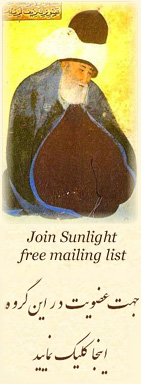Here, Sunlight offers three small excerpts from Rumi's Mathnawi,
Book III, in versions by Coleman Barks and the Helminskis, and in
translation by Reynold Nicholson:
~~~~~~~~~~~~~~~~~~~~~~~~~~~~~~~~~~~~~~~~~
"Wean Yourself"
Little by little, wean yourself.
This is the gist of what I have to say.
From an embryo, whose nourishment
comes in the blood,
move to an infant drinking milk,
to a child on solid food,
to a searcher after wisdom
to a hunter of more invisible game.
Think how it is to have a conversation with an embryo.
You might say, "The world outside is vast and intricate.
There are wheatfields and mountain passes,
and orchards in bloom.
At night there are millions of galaxies,
and in sunlight the beauty of friends
dancing at a wedding."
You ask the embryo why he, or she,
stays cooped up in the dark with eyes closed.
Listen to the answer:
"There is no 'other world.'
I only know what I've experienced.
You must be hallucinating."
-- Mathnawi III, 49-62
Version by Coleman Barks
"We Are Three"
Maypop, 1987
~~~~~~~~~~~~~~~~~~~~~~~~~~~~~~~~~~~
Where is the nurse for the thirsty infant
who with kindness would offer the taste of
inner sweetness?
Where is she who would bar the way to
her self in order to open the way to
a hundred gardens of delight?
For the breast has become a barrier
between the infant and other delicious
tastes and countless nourishments.
Our life depends on weaning.
Strive to wean yourself little by little.
Wean yourself from this world's food
and become a healing sage like Luqman*.
Become a hunter of the hidden game.
-- Mathnawi III, 48-49; 52
Version by Camille and Kabir Helminski
"Rumi: Jewels of Remembrance"
Threshold Books, 1996
*Sunlight footnote: Luqman -- The Qur'an, Chapter 31, mentions him as
having received wisdom from God. Nicholson tells us, "He appears as a
sagacious [wise] negro slave in several anecdotes related by Rumi."
Nicholson notes elsewhere that one of these anecdotes "is identical
with a story which occurs in the 14th cent. 'Life of Aesop' by
Maximus Planudes. The medieval Arabic version of Aesop's Fables is
ascribed to Luqman."
~~~~~~~~~~~~~~~~~~~~~~~~~~~~~~~~~~~
Where is a nurse for the suckling babe? - that with kindness
she may sweeten the inner part of its mouth,
And, though she bar its way to her teat, may open up for it
the way to a hundred gardens (of delight)? -
Because the teat has become to that feeble (infant) a barrier
(separating it) from thousands of pleasures and dishes (of food)
and loaves (of bread).
Our life, then, depends on weaning. Endeavour (to wean
yourself) little by little. The discourse is (now) complete.
When man was an embryo his nourishment was blood: in like
fashion the true believer draws purity from filth.
Through (his) being weaned from blood, his nourishment
became milk; and through (his) being weaned from milk, he
became a taker of (solid) food.
And through (his) being weaned from food he becomes (a
sage) like Luqman*; he becomes a seeker (hunter) of the hidden
game.
If any one were to say to the embryo in the womb, "Outside
is a world exceedingly well-ordered,
A pleasant earth, broad and long, wherein are a hundred
delights and so many things to eat,
Mountains and seas and plains, fragrant orchards, gardens
and sown fields.
A sky very lofty and full of light, sun and moonbeams and a
hundred stars.
From the south-wind and from the north-wind and from the
west-wind the gardens have (the appearance of) wedding-feasts
and banquets.
Its marvels come not into (are beyond) descriptions: why art
thou in tribulation in this darkness?
(Why) dost thou drink blood on the gibbet of this narrow place
(the womb) in the midst of confinement and filth and pain?" -
It (the embryo), in virtue of its present state, would be in-
credulous, and would turn away from this message and would
disbelieve it.
Saying, "This is absurd and is a deceit and delusion," because
the judgment of the blind has no imagination.
Inasmuch as its (the embryo's perception has not seen any-
thing of the kind, its incredulous perception would not listen (to
the truth).
-- Mathnawi III, 46-62
Translation by Reynold A. Nicholson
"The Mathnawi of Jalalu'ddin Rumi"
Published and Distributed by
The Trustees of The "E.J.W. Gibb Memorial"
*Luqman -- see note accompanying preceding version
~~~~~~~~~~~~~~~~~~~~~~~~~~~~~~~~~~~~~~~~~
~
------------------------------------
Archive for Sunlight can be accessed at:
http://groups.yahoo.com/group/Sunlight /messages
To subscribe, please send an email to : sunlight-subscribe@yahoogroups.com
To unsubscribe, please send an email to: sunlight-unsubscribe@yahoogroups.com
Yahoo! Groups Links
<*> To visit your group on the web, go to:
http://groups.yahoo.com/group/Sunlight/
<*> Your email settings:
Individual Email | Traditional
<*> To change settings online go to:
http://groups.yahoo.com/group/Sunlight/join
(Yahoo! ID required)
<*> To change settings via email:
Sunlight-digest@yahoogroups.com
Sunlight-fullfeatured@yahoogroups.com
<*> To unsubscribe from this group, send an email to:
Sunlight-unsubscribe@yahoogroups.com
<*> Your use of Yahoo! Groups is subject to:
http://info.yahoo.com/legal/us/yahoo/utos/terms/







No comments:
Post a Comment